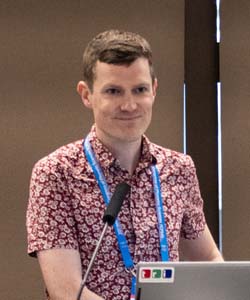Modeling Linguistic Networks
Presenters: Rory Turnbull
BMRC2
This workshop meets 9 times. Network science is the study of complex systems, formalized as networks consisting of nodes and links between nodes. This workshop provides an introduction to the application of network science to linguistics. Network models are applicable to a wide range of topics in nearly every linguistic subfield. This workshop will cover the use of word networks to model semantic, syntactic, morphological, or phonological relations among words; the use of social network and epidemiological modeling to examine the spread of linguistic patterns throughout a community; and how dynamical models can be used to simulate the growth or shrinkage of such networks. As such, these models touch on various topics in phonology, morphology, semantics, syntax, first and second language acquisition, historical and sociolinguistics, psycholinguistics, and beyond. The workshop will provide hands-on experience in coding and developing network analyses. Prior experience in Python or a similar programming language is beneficial but not required. Throughout the workshop, attendees will develop a small research project tuned to their interests.
Keywords: Networks, Python, Quantitative Methods, Sociolinguistics, Computational Modeling, Psycholinguistics, Variation, Language Change, Learning, Lexicon
Room STB 254, Mondays and Thursdays, July 7-August 7, 1:00pm - 2:20pm
Mondays and Thursdays
Presenters

Newcastle University
Rory Turnbull is a Senior Lecturer in Phonetics and Phonology in the School of English Literature, Language, and Linguistics at Newcastle University. He holds degrees from Ohio State University and the University of Edinburgh, and has held appointments at the Laboratoire de Sciences Cognitives et Psycholinguistique and the University of Hawai‘i at Mānoa. His primary research interests are at the intersection of phonetics, phonology, and psycholinguistics, and address how people use and mentally represent the sounds of language. More generally, he is interested in the ways that frequency, predictability, and other usage-based factors influence linguistic sound structures. His current research uses a multidisciplinary approach to examine the role of the phonolexical network in speech processing.
Room STB 254, Mondays and Thursdays, July 7-August 7, 1:00pm - 2:20pm
Mondays and Thursdays
